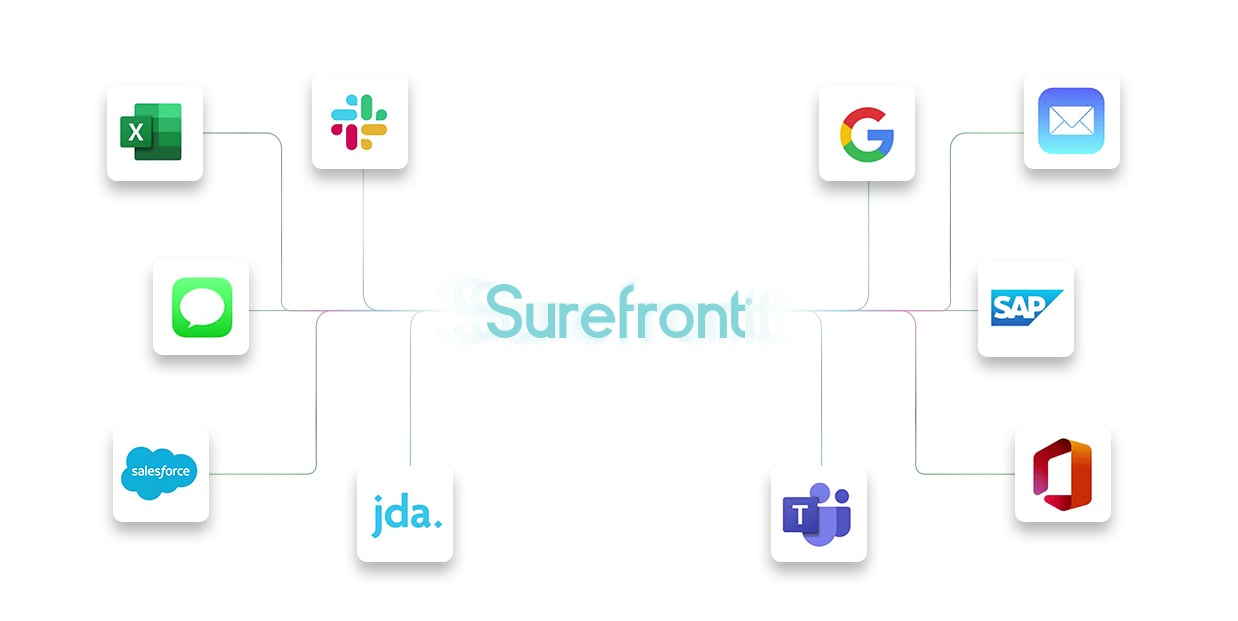Share this
Product Information Management Software Reviews
by Surefront on Jul 12, 2023 9:09:13 AM
Home > Blog > Product Information Management Software Reviews
Table of Contents- What is Product Information Management
- What Are the Benefits of Product Information Management Software?
Streamlining Data Management for Enhanced Business Success
Efficiently managing product information is crucial for businesses that want to stay competitive in today's retail environment, but it's not easy to do.
Enter the lofty Product Information Management system (PIM) -- the answer to retailers' and suppliers' prayers. PIM software plays a vital role in effective product information management, helping to manage disparate data across multiple platforms and touchpoints.
In this article, we'll cover the basics: we'll review the definition of Product Information Management (PIM), then dive into an overview of Product Information Management (PIM) software, who uses it, and its benefits. We'll then review five of the most popular PIM software systems: Surefront, Akeneo, Syndigo, Salsify, and inRiver.
So, first thing's first: what exactly is Product Information Management (PIM)?
What is Product Information Management (PIM)?
Product Information Management (PIM) refers to the process of collecting, organizing, enriching, and distributing product-related data, including: attributes, descriptions, images, documents, and other digital media.
Product Information Management (PIM) enables businesses to centralize and manage their product information in a structured and consistent manner. This ensures accuracy, completeness, compliance -- and a better run business.

What is Product Information Management Software?
We can't say it enough. Managing product information in an organized and efficient fashion is tough. Product Information Management software was made to help by facilitating the management of product data throughout its lifecycle.
PIM software platforms provide a centralized repository where businesses can store and manage their product information using features that include: data modeling, data enrichment, workflow automation, integrations, and reporting and analytics.
The result? Streamlined data management processes, effective collaboration, and accurate product information distribution across various sales avenues and marketing channels.
Who Uses Product Information Management (PIM) Software?
Retailers, e-commerce businesses, manufacturers, distributors, and suppliers dealing with a wide range of products all use a PIM system in their daily workflows. The intelligent data hub is particularly beneficial for businesses with large product catalogs, complex data structures, and the need for seamless data exchange across multiple systems and distribution channels.
What Are the Benefits of Product Information Management Software?
There are multiple benefits of a Product Information Management system, including:
Enhanced Data Accuracy and Consistency:
Companies that use information management (PIM) software gain peace of mind knowing that their product data is accurate, complete, and consistent across all channels. The systems eliminate data discrepancies, reduce errors, and improve customer trust by providing up-to-date, reliable information.
Improved Efficiency and Productivity:
With centralized data management and automated workflows, PIM tools streamline data processes, eliminate manual tasks, and reduce time-to-market. As a result, overall operational efficiency improves and teams are able to focus on strategic activities.
Seamless Integration and Product Data Syndication:
A PIM tool facilitates seamless integration with other business systems, such as ERP and CRM systems, ensuring data consistency across the organization. It also enables efficient syndication of product information and other digital assets to numerous channels, e commerce websites and marketplaces.
So teams can distribute assets and data with lighting speed. This expands the reach and visibility of products. Maximum efficiency = more sales and higher revenue. And who doesn't want that?
Data Governance and Compliance:
PIM software provides robust data governance features, allowing businesses to define and enforce data standards, operational processes, rules, and workflows. This ensures the ever important compliance with industry regulations and internal policies.
Actionable Insights and Decision-Making:
Product information management software offers powerful reporting and analytics capabilities. It provides businesses with valuable insights into product data quality, performance metrics, and market trends. These insights enable data-driven decision-making and optimization of product strategies.

Efficient Sales Channels:
PIM software ensures that all product information is consistent across all sales channels. This means that whether a customer is shopping online, in-store, or through a catalog, they will see the same product descriptions, specifications, and images. This consistency enhances the customer experience and builds trust in the brand.
PIM systems can also store and manage a wide range of product information, including customer reviews, instructional videos, and personalized recommendations. This rich, detailed product information can be used to create personalized shopping experiences that boost customer engagement and sales.
Digital Asset Management:
PIM systems with DAM capabilities provide a centralized dashboard for storing and managing all digital documents and assets associated with a product. This includes product images, videos, manuals, marketing materials, and more.
Best PIM System for Business Users
Now lets highlight the pros and cons of several popular product information management software vendors. We'll talk abou: Surefront, Akeneo, Salsify, inRiver, and Syndigo. Each vendor brings strengths and capabilities to the table, catering to different business needs and requirements.
By examining their features and functionalities, businesses can make informed decisions and select the PIM software solution that best aligns with their objectives.
Surefront
Surefront is a leading provider of cloud-based Product Information Management (PIM) software that is quickly gaining popularity among retailers and suppliers. It offers a comprehensive set of features designed to simplify and streamline the management of product data.
What Surefront is Known For:
Product Syndication
Surefront supports data syndication to multiple sales and ecommerce channels, allowing businesses to efficiently distribute information and sell across more platforms.
With Surefront, you can syndicate product data to create customized product listings for 100s of eCommerce channels in a single click. Use the tool to upload digital data to multiple sales channels in just seconds, improving the integrity and quality of your data without the manual effort.
Category Management
Using Surefront, you can visualize and optimize assortments on a user friendly interface, reviewing a complete design and components library for each product.
Surefront also allows you to integrate your inventory management and POS system data to easily distribute it to all of your e commerce channels.
Customizable Exports
Surefront's PIM software helps get your product to consumer faster with item setup sheets, quote sheets, and product order worksheets. Customize POs to fit 100s of retailers' specifications in just a few clicks.
Centralized Data Management:
Surefront's PIM software provides a centralized repository where businesses can store and organize all their product information. This centralization ensures that product data is easily accessible to authorized users across departments and locations.
A single source of truth means no more data silos and improved data consistency throughout the organization.
Data Enrichment and Validation:
Surefront understands the importance of enriching product data to boost the customer experience. So they offer comprehensive tools for enhancing all kinds of product information. Users can easily add, edit, and supplement product attributes, ensuring that product data is accurate, up-to-date, and consistent.
Data standards are paramount, of course. So Surefront offers validation checks to ensure that data meets predefined rules and standards, further improving data quality.
Workflow Automation:
A software system should work the way a user needs it to work. Robust workflow automation capabilities make it so with Surefront, which allows businesses to define and customize workflows based on their specific processes and requirements.
Specifically, users can design workflows to manage the creation, review, and approval of product data, ensuring efficient collaboration among team members. And task assignment and automated notifications keep team members informed about pending tasks and approaching deadlines, so nothing gets missed.
Integrations:
Surefront recognizes the need for seamless integration with other systems in the retail ecosystem. The software offers integration capabilities with various systems, including ERP (Enterprise Resource Planning), CRM (Customer Relationship Management), and e-commerce platforms.
When you integrate all your business systems, you get consistent data across channels -- without the need for manual data entry or synchronization.
Reporting and Analytics:
Surefront's PIM software provides robust reporting and analytics features. Whether it's analyzing data completeness, measuring time-to-market, or identifying trends, Surefront's reporting and analytics capabilities empower businesses to make data-driven decisions.
Why Customers Love It:
Let us count the ways. Surefront's PIM software customers rave about its features and functionalities, including the flexibility to customize data models and structures according to their specific business needs.
The seamless integration capabilities of Surefront have garnered praise from customers, who appreciate the software's ability to integrate with various systems in their technology stack.
And the data syndication feature is top notch, simplifying the process of distributing product information across multiple channels, leading to faster time to market and increased sales.
Surefront's scalability allows small and medium businesses to accommodate growing product catalogs and expand operations seamlessly.
Can't forget about ease of use. The software's user-friendly interface has been commended for its intuitive design.
Finally, there's Surefront's reporting and analytics capabilities, which allow for valuable insights into product data and performance. This enables optimized business strategies and more informed decisions for enterprises, as well as small and medium businesses.

Akeneo
Akeneo is an open-source PIM solution known best for its flexibility.
What Akeneo is Known For:
Flexible Data Modeling:
Akeneo offers a highly customizable data modeling engine that allows businesses to define their product data structure according to their specific needs. Users can therefore manage complex product hierarchies, attributes, and relationships, making the tool work the way they need it to.
Localization Support:
Strong localization capabilities allow Akeneo to help businesses adapt product information for different regions and languages. Businesses operating in global markets will want to leverage this feature.
Multi-channel Syndication:
Like Surefront, Akeneo enables businesses to syndicate product information to multiple sales channels, ensuring consistent product data across various touchpoints.
The Cons:
While Akeneo offers a good level of customization, it may not be sufficient for businesses with very specific needs. As such, some users have reported difficulties in customizing the platform to their exact requirements.
Another downside of Akeneo is its complexity, as it requires technical expertise and time for implementation and customization. This makes it less suitable for small businesses with limited resources.
Customer support should always be considered when evaluating complex software. Akeneo's customer support is considered lacking by some, who report that response times can be slow, and the quality of support is not always the greatest.
Last but not least, cost. The high cost of licensing and maintenance could be a barrier for budget-conscious organizations considering Akeneo.
Salsify
Salsify is a cloud-based PIM platform designed to simplify the management of product data and digital assets.
What Salsify is Known For:
Digital Asset Management (DAM):
Salsify combines PIM and DAM capabilities in one platform. This means you can manage product information and digital assets like images, videos, and documents in one place.
Data Validation and Workflow Automation:
Robust data validation and data quality tools, as well as workflow automation capabilities, garner Salsify favor among users.
Content Syndication:
Strong content syndication capability is considered to be one of Salsify's key features. This allows businesses to distribute product information to various retailers and marketplaces efficiently.
Product Experience Management (PXM):
Salsify goes beyond traditional PIM by offering PXM features. This is important for businesses that are looking to create and manage rich product experiences across various digital touchpoints.
AI-Powered Insights:
With Salsify, artificial intelligence features provide actionable insights on product performance, helping businesses optimize their product listings.
The Cons:
To fully utilize Salsify's features, users may need extensive training, which can be time-consuming and costly. Add to this that users report that Salsify's interface can be less intuitive and more difficult to navigate when compared to other PIM solutions.
Salsify may be lacking in a few others areas as well -- data import/export being one of them. While Salsify does supports data import and export, the process can be complex and time-consuming, especially for large datasets.
Finally, Salsify's reporting capabilities, while useful, may not be as comprehensive as some businesses might need for in-depth analysis.

inRiver
inRiver is a scalable PIM software trusted by businesses to manage complex product information across multiple channels.
What inRiver is Known For:
Modular Structure:
inRiver uses a modular structure, which allows businesses to choose and pay for only the features they need. This can make it a more cost-effective option.
Contextual Preview:
A contextual preview feature allows users to see how product information will appear on different platforms before it's published, helping to ensure consistency and accuracy across channels.
Graphical User Interface:
The tool's graphical user interface is user-friendly and intuitive, making it easier for users to navigate and manage product information.
Product Marketing Cloud:
inRiver's Product Marketing Cloud offers a set of tools for managing, enriching, and publishing product content, which can help businesses improve their product marketing efforts.
Collaboration Features:
Strong collaboration features allow multiple users to work on the same product data simultaneously, which can improve efficiency and productivity.
The Cons:
System performance issues abound with inRiver -- from integration limitations to disruptive system updates to data handling:
-
Because inRiver does not offer as many integrations with other platforms as some of its competitors, functionality of the tool might be limited for some businesses.
-
Some users have reported that updates and upgrades can be disruptive and may require additional configuration or customization.
-
There have also been reports of performance issues when inRiver is asked to handle large amounts of data, which could be a concern for businesses with extensive product ranges.
inRiver has a limited number of custom fields, which could restrict the level of detail businesses can include in their product information.
Finally, while inRiver does offer some analytics capabilities, they may not be as advanced or comprehensive as those offered by some other PIM solutions.
Syndigo
Syndigo is a software tool offering Master Data Management (MDM), Product Information Management (PIM), content creation, syndication, and analytics.
What Syndigo is Known For:
Content Experience Hub:
Syndigo's Content Experience Hub is a unique feature that allows businesses to manage, update, and distribute product content across multiple channels from a single platform.
Nutrition Database:
For businesses in the food and beverage industry, Syndigo offers a comprehensive nutrition database, which can be a valuable resource for managing and distributing nutritional information.
Retailer-Specific Requirements:
Syndigo has a feature that allows businesses to manage retailer-specific requirements for product information, which can help ensure compliance and reduce the risk of errors or inconsistencies.
GDSN Data Pool:
As a certified Global Data Synchronization Network (GDSN) data pool participant, Syndigo allows businesses to synchronize product information with global standards.
Content Validation:
Content validation features can help businesses ensure the accuracy and consistency of their product information.
Its Recent Riversand Purchase:
Riversand was well known for the following features:
-
Data Governance and Quality Management:
-
Riversand offered robust data management capabilities, allowing businesses to define and enforce data standards, rules, and workflows.
-
Master Data Management (MDM):
-
Riversand's MDM capabilities enabled businesses to manage not only product data but also customer data, sales layer, supplier data, and other critical master data domains. This holistic approach helps maintain consistency and accuracy across different data domains and digital channels.
-
Digital Asset Management (DAM):
-
DAM functionalities within Riversand helps brands manage and centralize digital assets, including digital data such as images, videos, and documents. This ensures that the right assets are associated with the appropriate products and readily available for distribution.
-
AI-powered Data Enrichment:
-
Artificial intelligence (AI) and machine learning (ML) algorithms automated data enrichment processes. This accelerates the enrichment of product data by automatically suggesting attributes, classifications, and translations.
The Cons:
Syndigo's user interface is not as intuitive or user-friendly as some other PIM solutions, according to users. What's more, Syndigo can be slow to process large amounts of data, which could be a concern for businesses with extensive product ranges.
While Syndigo offers a range of features, some users have reported that it lacks the flexibility to adapt to specific business needs or workflows. Customers expect ease of use from their PIM system.
Considering those extensive features, training and support is paramount. But Syndigo's training resources and customer support leave much to be desired.
Finally, Syndigo is considered a premium PIM solution, and its pricing may be a barrier for small businesses or startups.

Surefront, Akeneo, Salsify, inRiver, and Syndigo are all popular PIM software vendors offering comprehensive solutions for efficient product information management. But each vendor brings unique strengths to the table. Just look at Surefront's user-friendly interface and workflow automation, Akeneo's flexibility and localization support, Salsify's digital asset management and product experience management tools, inRiver's modular structure and graphical user interface, and Syndigo's content experience hub and content validation features.
When it comes to the question of which PIM system is right for a particular business, there is no singular answer. When evaluating PIM software vendors, businesses should consider their specific requirements, scalability needs, integration capabilities, and customer feedback.
It's important to choose a vendor that aligns with the organization's objectives. It should also provide the necessary features to optimize data management, collaboration, catalog management, and reporting in a centralized location. Ultimately, the right PIM system will help businesses master the ultra-competitive retail landscape by creating better customer experiences.
Share this
- PLM Software (36)
- PIM Software (29)
- Apparel & Fashion (20)
- Trending Topics (20)
- Merchandising (16)
- CRM Software (13)
- PLM Implementation (11)
- Catalog Management (6)
- Tech Packs (6)
- PLM RFP (5)
- Success Stories (5)
- Sustainability (5)
- Data Import (4)
- Line Sheet (4)
- Luxury Goods & Jewelry (4)
- Product Development (4)
- Retail (4)
- Supply Chain (4)
- Category Management (3)
- Home Furnishings (3)
- Wholesale (3)
- Consumer Packaged Goods (CPG) (2)
- Cosmetics (2)
- Data Export (2)
- Health & Beauty (2)
- RFQ & Quote Management (2)
- Consumer Electronics (1)
- Import & Export (1)
- Industry Events (1)
- Inventory Management (1)
- Pet Stores (1)
- Purchase Orders (1)
- Report Builder (1)
- Textiles & Raw Materials (1)
- Unified Solution (1)
- Vendor Management (1)
- Visual First (1)
- White Paper or Case Study (1)
- workflow (1)
- October 2025 (3)
- September 2025 (3)
- August 2025 (4)
- April 2025 (4)
- March 2025 (3)
- January 2025 (8)
- December 2024 (5)
- November 2024 (3)
- October 2024 (5)
- September 2024 (6)
- August 2024 (2)
- July 2024 (1)
- June 2024 (3)
- May 2024 (4)
- April 2024 (5)
- March 2024 (3)
- February 2024 (2)
- December 2023 (4)
- September 2023 (2)
- August 2023 (5)
- July 2023 (3)
- June 2023 (2)
- May 2023 (2)
- April 2023 (4)
- March 2023 (5)
- February 2023 (3)
- January 2023 (5)
- December 2022 (4)
- November 2022 (3)
- October 2022 (4)
- September 2022 (5)
- August 2022 (4)
- July 2022 (2)
- May 2022 (1)
- February 2022 (1)
- January 2022 (1)
- September 2021 (1)
- May 2021 (1)
- April 2021 (1)
- February 2021 (1)
- May 2020 (1)